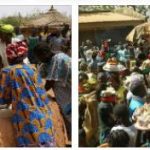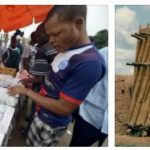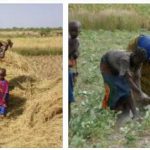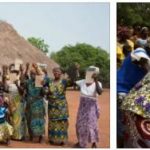1958 – 1960 independence
After the Second World War, the returnees, the ” Anciens Combattants “, became figures of transition. They owed their position, reputation and monthly pension to no traditional system, but to the colonial power of France, of which they were subjects. They were very disappointed not to be recognized as equal citizens of the country for which they had given their lives, as promised. A new politicization of the population emanated from them and with their dissatisfaction the striving for emancipation from France grew. A first step towards this was the 1947 at the urging of Moogho Naaba and his party, the Union Voltaïque (UV), restored colony of Upper Volta with a strong Mossi dominance and thus a strong nationalist tendency.
A new awareness arose with the movement of ” Négritude “, an expression of black self-determination. Its main representatives, the poets Léopold Senghor, Aimé Césaire [ interview] and Léon Gontran Damas described the African to the cold, rational white as a warm, soulful, ethical person who has to accept his responsibility in the world. White dominance was exposed as brutal and destructive, while African culture was idealized. Politically, the Negritude had a pan-African liberating tendency. Philosophically, however, she continued to understand the African from the world and in the language of the white who dominated him – a dilemma that ultimately led more to assimilation than to real emancipation of the “liberated” and thus opened gates to neocolonialism.
After the left-wing government of the “Front Populaire” in France had decided to humanize the colonies as early as 1936 and de Gaulle had promised the African peoples more independence and participation in Brazzaville during the war, anti-colonial voices increased in France after the war. Jean-Paul Sartre wrote the foreword to Frantz Fanon’s book “The Damned of This Earth”, which laid the philosophical basis for decolonization. The book “Black Skin – White Masks”, written with Sartre, deals with negativity. The documentary filmmaker René Vautier was shocked by the conditions in West Africa and attempted the harrowing realities of colonialism in his filmsto uncover. His footage from Upper Volta was confiscated by the colonial authorities and he was taken to court.
As an overseas department introduced by General de Gaulle, Upper Volta was finally able to send African representatives to the French parliament. The UV, determined by traditional dignitaries and the political elite, was soon ousted by the anti-colonial and equality-oriented RDA under the leadership of Daniel Ouezzin Coulibaly, which won the 1957 elections to a newly formed governing council.
With the adoption of the Constitution for the Fifth Republic in France, Upper Volta – like all the other colonies except Guinea – decided in a referendum to temporarily remain in the Communauté française and became an internally autonomous republic on December 11, 1958.
According to dentistrymyth, Félix Houphouët-Boigny from Ivory Coast, who with Léopold Sengor from Senegal was one of the main promoters of independence, failed a West African federation called the Mali Federation. With the name Mali, a bridge was sought to an old African empire in order to create a new pan-African identity.
On August 5, 1960, Maurice Yameogo, who had become President of the Government Council after the death of Coulibaly in 1958, proclaimed independence.
In 1940, the German occupying power in Paris left the administration of the French colonies to the Vichy regime. These came increasingly under the influence of General de Gaulle from Great Britain led “Free Frankeich”. De Gaulle wanted to liberate France from the colonies if necessary. Following the Brazzaville Conference on February 8, 1944, he traveled through West Africa- including to Ougagadougou – made various concessions and called on the French and Africans to liberate France. As for the First World War, for the Second World War, and later for the Indochina and Algerian Wars, Tirailleurs Sénégalais were recruited in the colonial area to fight under the French flag. De Gaulle’s “Declaration of Brazzaville” was used to justify demands for independence for African colonies after the Second World War.
Forced labor, forced migration, forced recruitment, poll tax and export-oriented monocultures were, in addition to incapacitating arrogant tutelage, the wounds that the colonial rulers inflicted on the ruled African tribes and which were to lead to a euphoric outcry for independence and self-determination. The legacy of colonialism is not limited to internal and external wounds. During the colonial period the foundations of a modern state were laid: demarcation, administrative structure, official language, monetary economy, schools and health care as well as the introduction of ideas of the Enlightenment. The country’s involvement in the development of a globalizing world took place under European diction.
While the era of imperialism ended with the First World War, the Second World War boiled down to the end of colonialism.








